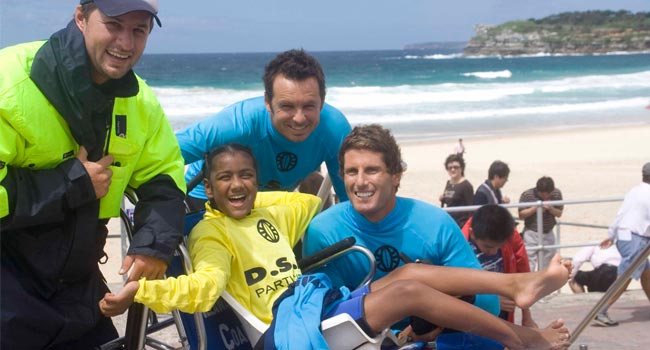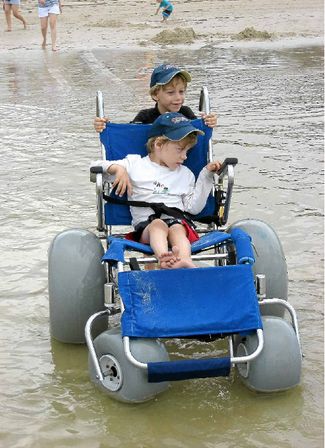Local councils are wasting money trying to improve beach access for people with disabilities because they don’t talk to people with expert knowledge beforehand, says the Disabled Surfers Association (DSA).
DSA President Gary Blaschke said well-meaning councils sometimes went ahead and installed ramps or beach matting but they often chose the wrong beaches or used the wrong products because they did not seek advice from groups like the DSA first.
Mr Blaschke said disabled surfers did not seek out the most popular surfing beaches with the best waves, instead they looked for beaches with small waves, plentiful car parking and disabled toilets, ramps and beach wheelchairs. They also chose beaches where they did not inconvenience other surfers.
Government News spoke to Mr Blaschke after Lake Macquarie City Council (near Newcastle, NSW) announced $35,000 for beach matting at Caves Beach as part of the NSW government’s Liveable Communities Program.
He praised the council and state government for wanting to improve beach access for people with disabilities but he said Caves Beach was not a good choice.
“I don’t think Caves Beach is the right beach. It’s very high impact [the waves are strong]. It isn’t a beach you can go for a stroll along the sand,” Mr Blaschke said.
“There’s only one disabled toilet, limited parking and they have nippers there on Sunday so it’s absolutely chock-a-block. If you get there late you’re parking a kilometre away and for a person in a wheelchair it’s just not on.”
Mr Blaschke said Blacksmiths Beach was a better choice because it had a lot more parking, better infrastructure and was more condusive to going for a stroll.
he said beach matting was “a fabulous idea” if it was carefully thought out and if it was put on an appropriate beach.
“Beach matting is a very expensive material. I really think there needs to be a bit of a moratorium on this. Local councils are going off and doing their own thing. Some beaches are not conducive to beach matting.”
But a spokeswoman from Lake Macquarie City Council said Caves Beach was chosen after consulting widely with people from the Disabled Surfers Association and the Hunter Disability Network and other representatives from the ageing and disability sector as well as council lifeguards, Blacksmiths and Caves Beach Surf Clubs and qualified access consultants.
“Caves Beach was chosen because it has a well-defined and generally hard tidemark, the beach does not experience dramatic changes unless during extreme weather events, it is relatively sheltered due to the surrounding cliffs and it has the strongest reported patrols of the four Lake Macquarie City beaches,” the spokeswoman said.
“There is also a continuous path of travel from the two designated accessible parking bays at Caves Beach linking to the proposed matting. Plans to increase the designated accessible parking bays are being considered.”
More generally, Mr Blaschke said that it wasn’t just about local councils choosing the wrong beaches, sometimes the adaptations designed to get people onto the beach in the first place were badly thought out.
He said some ramps conformed to Australian standards but the gradient was wrong and they did not include features such as an area for wheelchair users to rest.
“Councils build things without understanding the standards. A disability access ramp is a minimum of a one in fourteen gradient with a handrail or one in twenty without one. It’s so important to get the gradients right because you can build something that may not be accessible.”
Mr Blaschke gave the extreme example of a long, steep zig-zagging path on Victoria’s Phillip Island, where an able-bodied person would struggle to push somebody in a wheelchair back up the path and a solo wheelchair user would be stuck on the beach, unable to get back up.
He cited Lakes Beach on the Central Coast as an example of the kind of beaches that should be chosen and the infrastructure that needed to be supplied.
“We chose it not because it’s the best beach in the world but because it has the world’s best disabled access ramp and 360 car parking spaces. If you’re going to say this is the beach for people with mobility or disability issues they have to be able to park there.
“Most beaches, Bondi for example, you’ve got limited parking or you’ve got to pay for it. There are issues that have to be looked at.”
Lakes Beach also has a drop-off area for cars, a cordoned off safety zone and tactiles on objects like handrails for the visually impaired.
He also singled out Collaroy Beach and Warringah Council for praise. The DSA held a huge surfing carnival on Collaroy last week which attracted 159 people with disabilities and 345 volunteers.
“[At Collaroy], there’s a pool with a ramp, several disabled toilets and the waves are very small.”
Mr Blaschke said councils and government at all levels needed to consider a myriad of factors when they wanted to make beaches accessible and to speak to people who knew what they were talking about before pushing ahead with projects.
“Just because you’re in a wheelchair and just because you sit on an access committee it doesn’t mean you understand what’s needed in a beach environment. It’s DSA’s thirtieth year taking people to the beach,” he said.
“I’m happy to speak to councils and to possibly write reports for them but 90 per cent say that’s not in their budget for the year. Perhaps next year or the year after.”
Surf lifesavers should have specific training in dealing with people with disabilities and disabled toilets should be locked so they weren’t vandalised (disabled people can still access them with a Master Locksmith’s Association Key or MLAK).
He believes a national or statewide strategy is needed to successfully open up beaches to every Australian, as well as to visitors who are disabled or elderly. It’s a strategy which he feels has massive potential, economically and socially.
“Unless we do it together and get it right we’re going to end up creating problems for the disabled where they’re going to end up getting hit by a huge wave and somebody is going to end up getting hurt.
“Really Australia should be leading the charge across all levels of government. About 32 per cent of the population [including the elderly or disabled] in most cases can’t get access to the beach. It really is becoming a big issue.”
Mr Blaschke said he had seen people on day release from hospital and people whose last wish was to be close to the ocean wheeled near to the ocean on boardwalks or ramps.
“You can see their body language change immediately. The therapeutic value of just being able to look at the ocean, to smell the ocean and to feel the breeze … it doesn’t matter if you can’t get onto the sand as long as you can get down to the beach and there’s some infrastructure there, if needed.
NSW Minister for Disability Services John Ajaka said the NSW Government s encouraged inclusion for people with disability, including access to some of the state’s most beautiful beaches.
“I recently launched the Disability Inclusion Plan. The Plan is central to the Disability Inclusion Act 2014, the government’s landmark legislation,” Mr Ajaka said.
“Under the newly launched NSW Disability Inclusion Act and NSW Disability Inclusion Plan, all local councils with a coastal frontage will have a responsibility to identify appropriate mechanisms for ensuring that access to community facilities and recreation is maximised for people with disability.”
Comment below to have your say on this story.
If you have a news story or tip-off, get in touch at editorial@governmentnews.com.au.
Sign up to the Government News newsletter



Small error in the story, the ratio for Access ramps are 1:14 with hand rails and 1:20 without hand rails.
Thanks Gary, Will amend. Marie.
Thanks Gary, Will amend. Marie.
As it is on a beach handrails will affect cross pedestrian traffic so a 1:20 walkway would be a better solution then handrails etc would not be required.
Hey Bruce, you’re spot on if you have the space to get the gradient before we’re out on the road.
Just some thought by everyone and the new act if it has any teeth, may be the answer?
Hi Marie Sansom
I like your post. It is providing very useful information. Here I would like to add some important facility that can also be used by the disabled people. It is known as the portable toilets. There are many benefits of disabled portable hire. Given below are some of them-
• Grab bars for easy entry & exit
• Non-slip flooring
• Low level toilet
• Accommodates wheelchair occupant & carer
• Wide access door interior
• interior indicator lock
• Hand sanitizer
• No ramp access ideal for wheelchair entry & exit
• Larger bench and grab rails allow for easy transfer from wheelchair to toilet
Why not nobbys beach!!!
There’s the walk along up past the light house, all wheelchair accessible, the park and the dog beach around it, enough parking!
The little food cafe, not sure about the toilets.
I have a 2.5yro in a wheelchair and he loves the beach but I am at my width ends trying to carry him and his brother down to play in the sand especially by myself.
Let’s get together and make a decision for the council and gov!!! We need this!
It would also bring tourist!!!
I have not yet seen any more information on this!
Trish Replas has the product and we would be more than happy to set up a trial piece of beach access if this would asist the council with a decision
Mark
Hi Trish, What you have to understand is the big picture. Nobbys beach is probably the best Newcastle has to offer, except the toilets need major attention, very little parking and competing with the general public especially in summer. It needs further infrastructure like a better ramp, maybe some matting, yet who looks after it and where do you store it?
Newcastle Council should be drafting their Disability Inclusion Plan, yet the real issue is who is having input into it and what is their expertise on access at beaches?
While having the use of beach wheelchairs is great for those like myself who are permanently in a chair what about those who are unable to walk on sand due to age issues, crutches, walking frames etc. Matting to me has a more important place than you seem to give it credit for. Please look at it from the perspective of all users and not just your surfers needs.